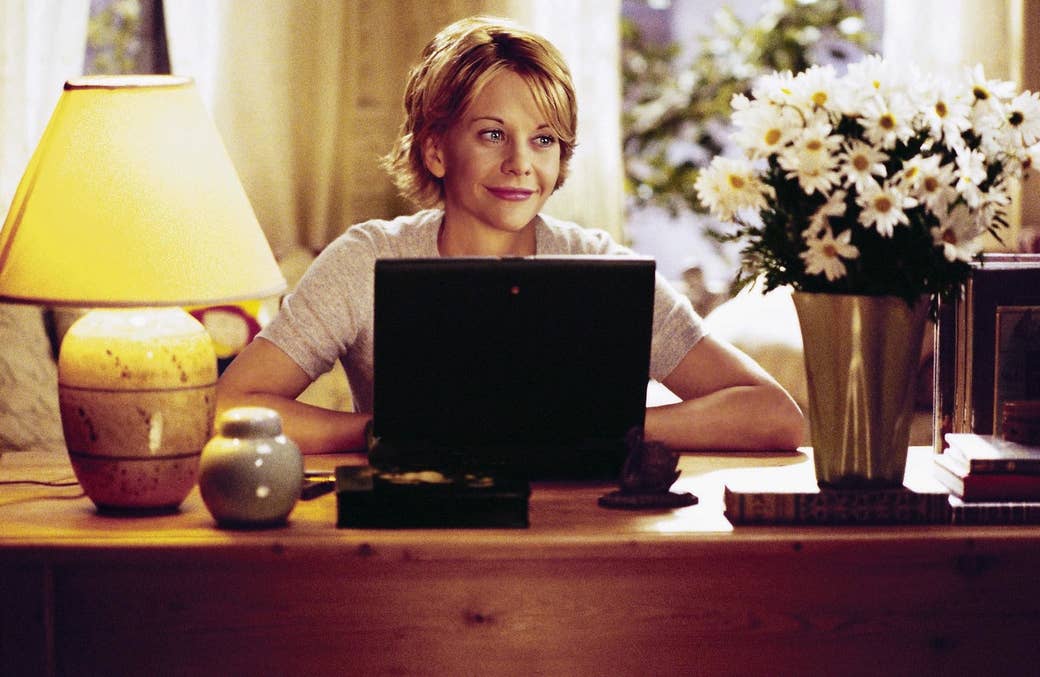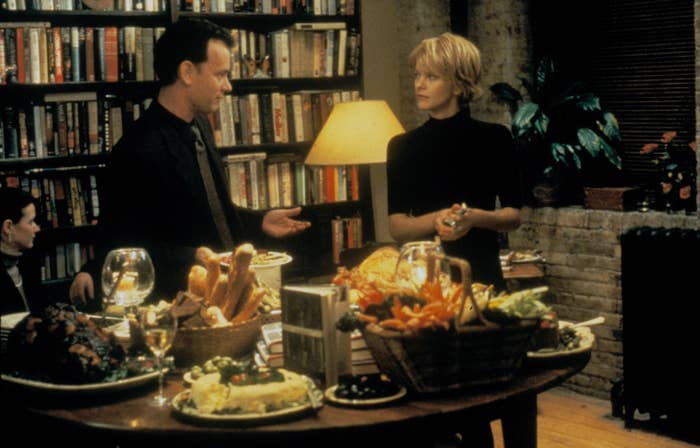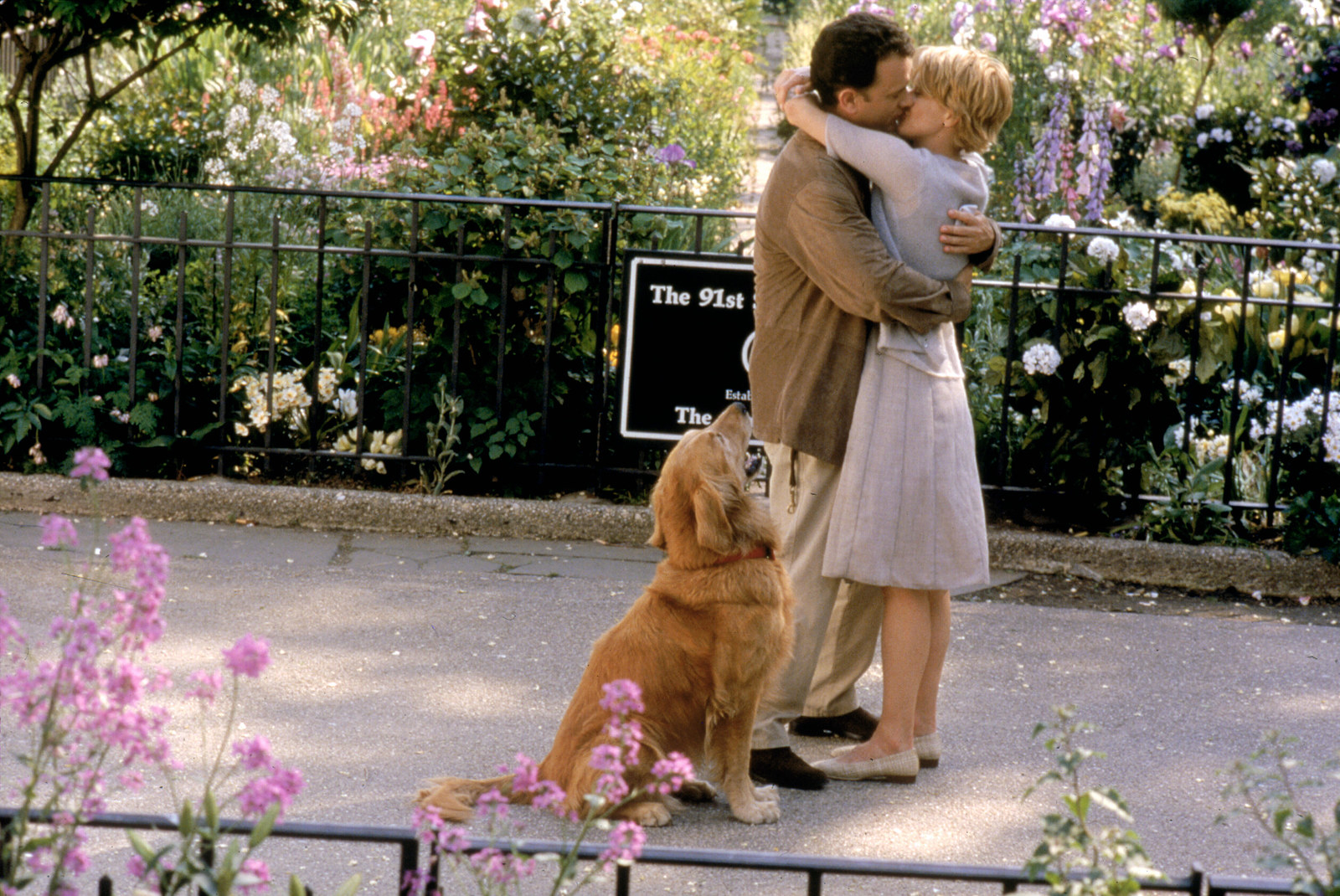
I don’t really like movies. This admission has ended a lot of dates with boring men for me — “Not even Waking Life????” — but they’re just not my preferred medium of entertainment. This is partly because I don’t have the attention span for them, but mostly because I’m not smart enough to understand them. I’m still completely furious that Leonardo DiCaprio convinced you all to watch a two-and-a-half-hour movie about him fucking a bear (or whatever, I never saw it) three years ago. But I will concede that there are a handful of good movies. Die Hard — obviously — the perfect Christmas movie. RoboCop, any iteration of it, but the remake was the first movie that ever made me cry in a theater, and it was deserved. Kingsman, a movie so exquisite I have seen it 46 times, once watching it 5 times in a row on a direct flight to India. And finally, there’s the best movie ever made, the only one that’s ever made me question my otherwise firm stance on movies being bad: You’ve Got Mail.
You’ve Got Mail is the kind of movie that you watch while channel surfing at your parents’ house, or while you’re at a friend’s house for a sleepover and she fell asleep long before you and you’re too afraid to sleep because her house sounds weird, or perhaps you watch it at a hotel in Fort Worth, Texas, while you’re away on business, and you think, well, it’s this or NCIS, and no one wants to watch NCIS. The point is, you don’t choose You’ve Got Mail. You’ve Got Mail chooses you.
This month marks the movie’s 20th anniversary, and despite the fact that it’s about outdated technology, a version of New York City that absolutely does not exist anymore, and two white people being white at each other, it’s still a remarkably enjoyable movie decades after its first release. In any normal context, this is the part where I’d give you a plot breakdown, but I know I don’t have to because there’s absolutely no possibility you haven’t seen this movie, in full or in little bursts over years of channel surfing and landing on Meg Ryan in a respectable turtleneck screaming, “THAT CAVIAR IS A GARNISH.” But if you have, somehow, never seen it, maybe because you recently awoke from a coma only to find that you’re engaged to a woman you don’t remember who’s actually in love with your brother (wait, sorry, this is the plot of While You Were Sleeping, a far inferior film), here’s a brief recap:

Meg Ryan plays a woman in clothes that do not fit her shoulders who owns a small but beloved indie bookstore in Manhattan. Tom Hanks plays an executive for Fox Books, a bookstore conglomerate (pre-Amazon) where everything is cheap, their bookstores are massive, and they can also sell you a nice cappuccino. Ryan and Hanks are mortal enemies due to the forces of capitalism, but they’re also unknowingly getting to know each other in an AOL chatroom, falling in love slowly but surely. Eventually, Hanks figures out that his internet crush is a woman whose business he’s about to destroy; he continues to court her anyway before revealing the truth. (There’s also a completely unnecessary subplot about Hanks’ father marrying a much younger woman who keeps hitting on Hanks before running off with the nanny).
For me, at least, You’ve Got Mail has an indelible quality that no other Meg Ryan movie has — not When Harry Met Sally, a film that suggests 80% of my friendships should end in poundland, nor Sleepless in Seattle, a movie that doesn’t work in large part because Meg Ryan has too much hair in it. You’ve Got Mail makes us feel nostalgic for a time that, arguably, never existed. Wasn’t it cute when people on the internet would catfish each other and neither person was a face-eating murderer? Remember how adorable we all looked in those chunky black shoes everyone was wearing in the ’90s? Isn’t it entirely charming that the villain in this movie is a big-box bookstore, as if anyone in our contemporary moment would be mad if any brick-and-mortar bookstore at all was a success, rather than ol’ Bezos with his Queens-based helipad. I have no idea what version of the world this movie is based off of, but it sure seems nice, and it’s a real pleasure to steep yourself in it for a few hours at least, watching a piecey pixie cut fall in love with Tom Hanks’ thick neck.

Maybe I like You’ve Got Mail because it keeps alive my old hope that the internet could be used for something beautiful. In Meg Ryan’s version of an internet chatroom, she timidly wanders into an over-thirties AOL chat group and finds people whose usernames are their apartment numbers and not, for example, “bitchkiller69.” She does not report getting a slew of dicks in her inbox, nor does anyone seem to ask her for a photo of her own anus. She doesn’t log in and start watching a YouTube video with Alex Jones hawking weird protein shakes while talking about how the wildfires in California are turning the trees queer. When she’s sad (after her future boyfriend destroys her business, by the way, a small detail that is never really addressed but oh well, this is the utopic past we’re talking about here), she sits on the floor and eats soup instead of doing what I do when I am sad and I have internet access: look up what my enemies are up to and then sign them up for unpleasant newsletters about the alt-right.
As if you would ever speak to a delightful creature on the internet, and when you’d go to meet her in person, she would a) show up, and b) look like the human equivalent of a cartoon bunny. You’ve Got Mail exists in a version of the world where the worst-case scenario of meeting someone online is that they just happen to be someone whose corporate ideologies you disagree with. That’s it?? Is she a neo-Nazi? Are there photos circulating of her in her graduating high school class doing the goddamn Hitler salute? No???? JUST MARRY HER, JOE.
It’s such a flawless movie, in fact, that we’re entirely willing to forgive how contemporarily heinous Tom Hanks’ character is. He catfishes a woman who would maybe want to know she’s having an emotional affair with her nemesis. He writes a rant about Starbucks orders like he’s never seen a single stand-up special on what the deeeaaaal is with putting hot milk in your coffee. He condescends to the cashier merely doing her job when some white woman tries to use a cash-only lane (relatedly: imagine a cash-only lane today, or alternatively, a grocery store where the cashier isn’t a malfunctioning robot!!!), and then he coaxes her into using the credit card machine. He does, indeed, take an alarming amount of caviar on his plate. He rolls his eyes at the idea of a book with hand-tipped illustrations costing a lot of money, when he himself works in books. He dumps his girlfriend, the impeccable Parker Posey, in order to go out with a girl he met on the internet, and we’re for some reason supposed to feel bad for him when the worst thing that happens to him is he has to move into his gigantic boat with his weird pervert dad. He never asks Dave Chappelle a personal question.

The movie also doesn’t really grapple with the consequences of its broken romantic relationships. Greg Kinnear, who plays Meg Ryan’s luddite boyfriend, is effectively emotionally cheated on throughout the movie, but at no point are you really required to feel bad for him. Besides, he and Ryan break up with each other at the exact same time, with no conflict, and no concerns about trashing what appears to be years of a relatively content relationship. Why isn’t Ryan getting bangs and crying in public more after this breakup?
Spelling this movie out is clearly a mistake; it forces you to confront too many inaccuracies and inconsistencies. I don’t know what version of the internet You’ve Got Mail is modeling itself after, but it’s certainly not one that I’ve ever experienced: The internet has always been murky, muddy, complicated, sometimes dangerous, often troubling, and rarely romantic. You’ve Got Mail makes us nostalgic for many things — remember when you would go to a restaurant and wait for someone and if they didn’t show up you just had to assume they died because you couldn’t text them? — but watching it today lets us pretend as if the internet was once a warm, comforting place full of glorious potential. But the internet was never pure; it was merely new.
Maybe we’ve earned a little bit of revisionist history, though, if only because it might inspire us to fight for a version of internet serenity — unrealistic, perhaps, but still nice to consider. Everyone needs something they can cling to that brings them back to their preferred version of humanity. Mine, I guess, is the possibility of logging on to a computer the size of my apartment, feeling excited when I hear the ping of a new email loading in my inbox, and reading a missive from someone who feels like an old friend. I haven’t had this feeling in a long time, so long that I’m not entirely sure I’ve ever had it, but I’ll watch You’ve Got Mail year after year, just to feel it for a little while. ●
